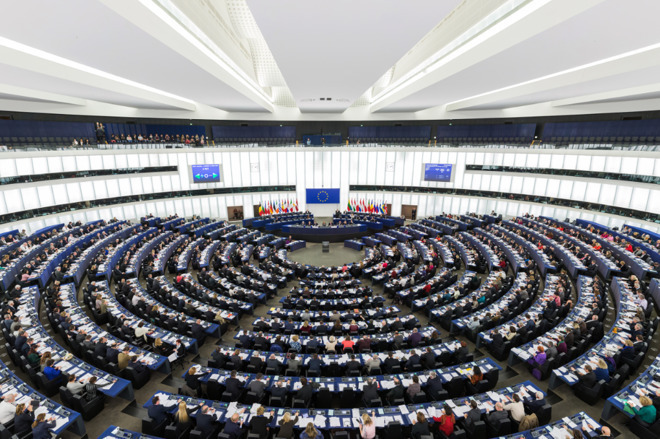Countries in the European Union have approved a refresh of copyright law approved by the European Parliament in March, including the controversial "Article 13" change that may affect user-generated content, with member states now having to implement the directive within each country's laws within the next two years.
In a vote by EU member states, 19 voted in favor of the rules becoming law, with six voting against the changes, while three abstained. Under EU law, the directive previously approved by the European Parliament has to be transposed into regional versions of laws within 24 months, even in countries where that state voted against the rule changes.
The copyright changes will place a greater emphasis on protecting owners and licensors of the content by forcing tech companies and distributors to offer increased protections to rights holders. Known as Article 13, the most controversial element makes firms put more efforts into policing the content on their services, including properly licensing copyrighted material, or be held liable for illegally shared content.
The rules not only apply to firms based in the European Union, as it also will impact practically every company that has an online presence accessible within the EU, including those on other continents. The full rules apply to larger firms, but smaller companies and startups have relatively fewer requirements.
"With today's agreement, we are making copyright rules fit for the digital age," said European Commission president Jean-Claude Juncker. "Europe will now have clear rules that guarantee fair renumeration for creators, strong rights for users and responsibility for platforms. When it comes to completing Europe's digital single market, the copyright reform is the missing piece of the puzzle."
It is thought firms like Google and Facebook will have to increase their copyright monitoring efforts with regard to user-generated content, to prevent those simply uploading copyrighted items. There are exceptions to the rules, protecting non-commercial purposes like Wikipedia and GitHub posts, as well as private cloud storage services such as Apple's iCloud and Dropbox.
Critics also believe the rules will effectively ban the creation and distribution of memes, but the European Parliament has already expressed the belief that "quotation, criticism, review, caricature, parody, or pastiche" will continue to be protected by existing mechanisms.
A secondary section, "Article 11," will require news aggregators to license anything larger than a "short extract" of a story that is shared with the audience. This effectively covers services like Google News, which offers headlines and short story snippets, as well as apps and services performing a similar task.
The introduction of the changes, said to be modernizing EU rules on data from as far back as 2001, but the EU is not the only entity to try and change how copyright is dealt with online.
The United States government made similar reform attempts in 2011 under the Stop Online Privacy Act (SOPA) and Protect IP Act (PIPA) House and Senate bills, preventing the sale of pirated or copyrighted goods online. The rules were criticized in many ways, including how it effectively applied to all websites in the world, cut off access to websites by DNS changes and potentially blocking all financial transfers to a site deemed to have infringed, even if it was only a small part of a larger overall online presence.
 Malcolm Owen
Malcolm Owen







-m.jpg)






 Charles Martin
Charles Martin
 Christine McKee
Christine McKee
 Wesley Hilliard
Wesley Hilliard

 Andrew Orr
Andrew Orr
 William Gallagher
William Gallagher
 Sponsored Content
Sponsored Content








15 Comments
There's so much wrong with this, where does one begin?
My question is, what happens if other jurisdictions decide to respond to this by enacting rules which effectively require that online platforms do the opposite? The EU is, effectively, presuming to impose its choice of regulations on much of the planet. (I don't mean to suggest that it is the only jurisdiction that has so presumed.) It isn't just regulating actions which are actually taken within its rightful jurisdiction.
So what if other jurisdictions, understandably bristling at that arrogance and disagreeing with these regulatory policies, pass regulations which effectively prohibit online platforms from blocking (or removing) uploaded content which would otherwise be allowed, based on the possibility that it might violate copyrights, unless and until a judicial determination is made (on a case-by-case basis) that given content does violate copyrights? That, to me, seems like an obvious response which other jurisdictions might consider as sort of a protest to the EU's arrogance and, what some might see as, misguided regulations. What would global platforms do then?
Also, this general response from the European Parliament and supporters of Article 13...
... evades the point. The issue isn't whether given content is or isn't protected (from copyright claims) based on it being, e.g., parody or review. The issue is, how can an online platform possibly know ahead of time (e.g. ahead of a judicial determination) that given content is so protected? Without devoting implausible amounts of resources to making individual determinations with regard to uploaded content? The only plausible policy might be to treat all content as not protected. That's one of the problems which this regulation creates or exacerbates.
Say goodbye to the EU. It was (not a lot of) fun while it lasted.